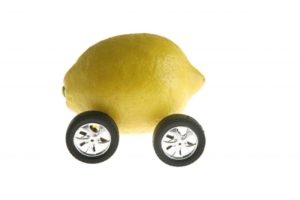It’s an all too common story: the new car you bought or leased keeps breaking down. What you thought was going to be a happy purchase has become a repeating nightmare. You take it to the dealer to get it fixed, only to get back your “repaired” car, which just won’t work. You’re tired of spending valuable time and energy just to keep the car working for a day or two, and you’re worried that you just spent thousands of dollars on junk. Fortunately, California has laws to protect you and other car buyers from these malignant machines. The “Lemon Law” was written so that your hard-earned money is not wasted.
 How to determine whether your car is a lemon
How to determine whether your car is a lemon
A car is a lemon when its use, value or safety is substantially impaired. What that means is that problems you keep having to get fixed have significantly impacted your use of the car, significantly reduced its re-sell value or, more importantly have placed you and your loved ones in danger.
Figuring out whether your car’s problems can be classified as a substantial impairment should not be your concern. The Lemon Law was written to protect you and ensure that you get the most value and use of your purchase and that’s just what this article will accomplish.
When considering what can impair a car’s use or value, it’s important to understand that such an impairment can occur in many different ways. While there is no clear definition of what can be considered a “substantial impairment”, one thing you must remember is that you should not be penalized for any of your car’s defects. In other words, you should enjoy the car you paid for not the car you bought.
Don’t despair if you think your problems aren’t a substantial impairment. There are numerous examples of some not so obvious and seemingly trivial problems which have fallen under the Lemon Law. Defects in the car’s paint job, constant foul order in the interior, electrical problems, overheating seats, or issues with the climate control system can all substantially impair your use of the car. More importantly, these problems will make it incredibly hard to sell your car to any prospective buyer.
Finally, if your car is exhibiting problems which substantially impair the safety of your vehicle, California’s Lemon Law will help to ensure your safety in a new car.
Here is how California’s Lemon Law works
If you think your car has a substantial impairment, is new or used but still covered by the original manufacturer’s warranty, and the impairment was discovered within the first 18 months or 18,000 miles of the life of the car, then the law likely applies to your situation.
First, you must allow the manufacturer or an authorized dealer to perform a reasonable number of repair attempts. Reasonable number just means about four attempts in California, but in cases of potentially life-threatening problems, such as faulty brakes, manufacturers are given only two attempts at repairing your vehicle. Additionally, if the car has been in the shop for more than 30 days (doesn’t have to be in a row) and it is still not fixed, you’re now entitled to seek a replacement or refund.
When a manufacturer cannot ultimately fix the problem, they must replace the lemon with a new, substantially identical car or issue you a full refund of your purchase price. The decision to get a new vehicle or get your money back is completely up to you. If you choose to get your money back though, it will not include the costs of aftermarket items installed on the car. You will however, be compensated for any and all incidental costs you incurred trying to have your lemon fixed at the dealership or mechanic, such as towing and car rental fees.
You should also be aware that some money will be deducted for any limited mileage on the car noted when you first brought in the car for repairs. This cost roughly equals about 1% of the vehicle’s purchase price for every 1,200 miles noted on the odometer.
Why hire an attorney to prosecute your Lemon Law claim
Like with most laws, there are some obstacles. Remember that this law only applies as long as the manufactures warranty on your vehicle remains valid. This is important because it is the manufacturer’s responsibility to compensate you for your lemon. An authorized dealership will not be responsible for providing you with a new car or your money back.
It sure won’t come as a surprise that most manufacturers are not in the business of giving away new cars or refunding the purchase price of used vehicles, so don’t be surprised if the manufacturer pushes back. The dealer is also going to side with their parent company. This is why it is important to keep careful records, as the dealer may argue that any problems were caused by abuse or that such problems are not covered under warranty. They may put up a fight and argue that the Lemon Law does not apply.
You should also be on the lookout for instances where a dealership may try and take your car and offer to trade it in for a more expensive vehicle. In such instances, the dealership will likely highly devalue the trade in value of your car, seeking only to make a cash grab. It is advisable to use the dealership to repair the problems with your car.
In order to avoid these situations and to protect your rights, have an attorney contact the manufacturer directly as ultimately, it is the manufacturer that will be required to replace your car under the Lemon Law.
Conclusion
You should not have to tolerate owning a lemon, California’s Lemon Law applies to any new vehicle that is used primarily for personal and home use (including boats and motorcycles, etc.).
Business vehicles can also be covered by Lemon Law provisions under certain circumstances.
Finally, remember, you have the right to enjoy the car you paid for not the car you bought.
Note: This article is to be used as an educational guide only and should not be interpreted as a legal consultation.
